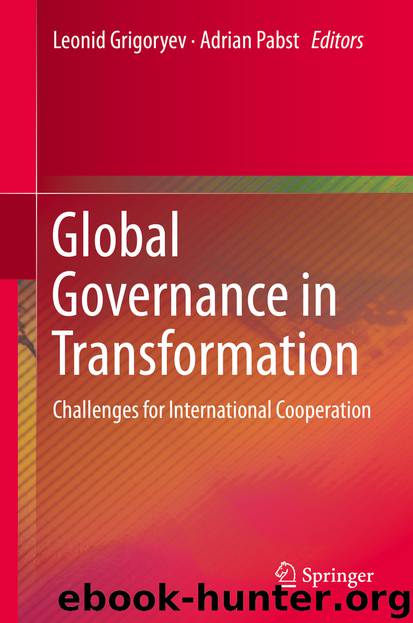Global Governance in Transformation by Unknown

Author:Unknown
Language: eng
Format: epub
ISBN: 9783030230920
Publisher: Springer International Publishing
APEC
Former Australian Prime Minister Bob Hawke first suggested the creation of APEC during a speech in Seoul, South Korea in 1989. A few months later, representatives of 12 Asia-Pacific economies met in Canada to establish APEC (APEC 2018a). To this day, APEC has not proclaimed itself explicitly a security organisation. During the 2000 APEC summit, US Secretary of Defense William Perry suggested that APEC could enlarge its agenda to include security issues. His proposition was rejected, however, due to doubts that APEC could sustain the wide variety of issues on its agenda (Lee 2005). One of the main items on APEC’s agenda is the provision of ‘balanced, inclusive, sustainable, innovative and secure growth’ for its members through regional economic integration. Since 1989, APEC has focussed on providing economic interdependence in the Asia-Pacific by fostering regional prosperity (APEC 2018a).
APEC’s initial interest in and shift towards more security-related issues began after the terrorist attack on the Twin Towers on September 11, 2001. This heightened interest stemmed from both the international importance of the issue and its effects on APEC members. The importance of those events for US foreign and domestic policies and the stability of the Southeast Asian region, for example, showed that it was more than a broad international issue: the devastating effects of international terrorism were reaching APEC. Following 9/11, many of APEC’s Southeast Asian members such as Malaysia and the Philippines became more involved in the war on terror, providing support to the US and receiving military support in return for fighting domestic terrorism and insurgent groups. Many have argued that such groups are a potential source of recruitment and intelligence for radical terrorist groups in the Middle East. In their 2001 Shanghai Statement on Counter-Terrorism, APEC leaders explicitly acknowledge the devastation terrorism causes to trade, peace and prosperity, thus rendering all forms of terrorism ‘a direct challenge to APEC’s vision of free, open and prosperous economies and to the fundamental values that APEC members hold’.
In 2003, one of the first reports written on terrorism’s impact on trade concluded that terrorism decreases bilateral trade and GDP and that the most likely to feel those changes are developing countries—that comprise a large portion of APEC members (Raby 2003).
APEC strategies have developed in recent years. Up through 2013, it enhanced efforts to combat terrorist financing by closely monitoring money laundering practices and corruption (APEC 2013). This has been especially relevant for countries with high CPR indexes such as the Philippines and other Southeast Asian countries. In recent years, measures have focussed more on securing safe mobility.
Download
This site does not store any files on its server. We only index and link to content provided by other sites. Please contact the content providers to delete copyright contents if any and email us, we'll remove relevant links or contents immediately.
Tools of Titans by Timothy Ferriss(8402)
Change Your Questions, Change Your Life by Marilee Adams(7786)
Deep Work by Cal Newport(7089)
Playing to Win_ How Strategy Really Works by A.G. Lafley & Roger L. Martin(6316)
Man-made Catastrophes and Risk Information Concealment by Dmitry Chernov & Didier Sornette(6022)
Big Magic: Creative Living Beyond Fear by Elizabeth Gilbert(5778)
Digital Minimalism by Cal Newport;(5767)
Ego Is the Enemy by Ryan Holiday(5453)
The Slight Edge by Jeff Olson(5420)
The Motivation Myth by Jeff Haden(5214)
The Laws of Human Nature by Robert Greene(5213)
Stone's Rules by Roger Stone(5089)
Tuesdays with Morrie by Mitch Albom(4788)
Eat That Frog! by Brian Tracy(4543)
Rising Strong by Brene Brown(4465)
Skin in the Game by Nassim Nicholas Taleb(4255)
The Money Culture by Michael Lewis(4211)
Bullshit Jobs by David Graeber(4195)
Skin in the Game: Hidden Asymmetries in Daily Life by Nassim Nicholas Taleb(4010)
